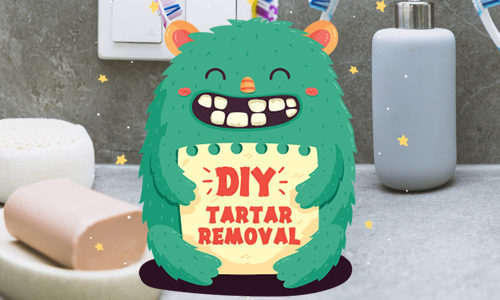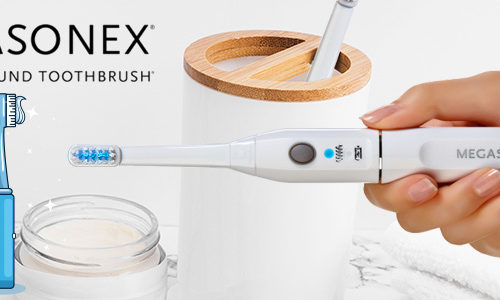
Toothpaste – which is best? Questions and answers
There is no one “right” toothpaste that suits everyone, so choosing “the one” can be tricky and difficult. With our guide this task will be a lot easier, so please check back soon for full upcoming article.
DIY toothpaste recipe
Here is a simple recipe for DIY toothpaste that you can make at home:
Ingredients:
- 1 tablespoon baking soda
- 1 teaspoon hydrogen peroxide
- 1 teaspoon water
- 1 drop peppermint essential oil (optional)
DIY toothpaste instructions:
- In a small bowl, mix together the baking soda, hydrogen peroxide, and water. Stir until the ingredients are well combined and have formed a paste.
- If desired, add a drop of peppermint essential oil to the paste for a refreshing and minty flavor.
- Transfer the paste to a small container with a lid, such as a small jar or plastic container.
- To use the toothpaste, wet your toothbrush and scoop a small amount of the paste onto the bristles. Brush your teeth as usual, making sure to brush all surfaces of your teeth and gums. Spit out the toothpaste and rinse your mouth with water after brushing.
This DIY toothpaste recipe is a simple and effective way to clean your teeth and maintain good oral health. The baking soda and hydrogen peroxide work together to remove plaque and bacteria from your teeth, and the peppermint essential oil provides a refreshing and minty flavor. You can adjust the ratio of ingredients to your preference, and you can also add other ingredients, such as xylitol or coconut oil, to enhance the effectiveness of the toothpaste.
Ginger powder toothpaste
Ginger powder can be added to toothpaste to provide additional benefits for your oral health. Ginger is a natural ingredient that has anti-inflammatory and antibacterial properties, which can help to reduce swelling and kill bacteria in your mouth. It also has a spicy and refreshing flavor that can help to freshen your breath. To make ginger powder toothpaste, follow these steps:
- In a small bowl, mix together 1 tablespoon of baking soda, 1 teaspoon of hydrogen peroxide, and 1 teaspoon of water. Stir until the ingredients are well combined and have formed a paste.
- Add 1/4 teaspoon of ginger powder to the paste, and stir until the ginger is well distributed throughout the paste.
- Transfer the toothpaste to a small container with a lid, such as a small jar or plastic container.
- To use the toothpaste, wet your toothbrush and scoop a small amount of the paste onto the bristles. Brush your teeth, as usual, making sure to brush all surfaces of your teeth and gums. Spit out the toothpaste and rinse your mouth with water after brushing.
By adding the ginger powder to your toothpaste, you can enjoy the benefits of this natural ingredient for your oral health. Ginger can help to reduce inflammation and kill bacteria in your mouth, and it can also provide a refreshing and spicy flavor. You can adjust the amount of ginger powder in the toothpaste to your preference, and you can also add other ingredients, such as xylitol or coconut oil, to enhance the effectiveness of the toothpaste.
Strontium chloride toothpaste
Strontium chloride is a compound that is sometimes added to toothpaste to provide additional benefits for oral health. Strontium chloride is a form of strontium, a naturally-occurring mineral that is similar to calcium. Strontium has been shown to have some potential benefits for dental health, such as reducing tooth sensitivity and promoting the remineralization of tooth enamel. However, strontium chloride is not commonly found in commercial toothpaste, and there is limited research on its effectiveness and safety for oral health. If you are considering using a toothpaste that contains strontium chloride, it’s important to talk to a dentist or oral health care provider first to discuss the potential risks and benefits. A dentist can also provide guidance on the best toothpaste for your individual needs and oral health concerns.
Effectiveness of prescription toothpaste 5000 PPM
Prescription toothpaste with a fluoride concentration of 5000 parts per million (ppm) is generally considered to be an effective way to prevent tooth decay and promote good oral health. Fluoride is a naturally-occurring mineral that is found in many foods and water sources, and it is well known for its ability to strengthen tooth enamel and prevent tooth decay. The American Dental Association (ADA) recommends using toothpaste with a fluoride concentration of at least 1000 ppm for adults, and a concentration of at least 1500 ppm for children under the age of six. A toothpaste with a fluoride concentration of 5000 ppm is considered to be a high-concentration toothpaste, and it is typically only available with a prescription from a dentist. High-concentration fluoride toothpaste can be effective for preventing tooth decay and promoting good oral health, but it can also cause side effects such as tooth staining or fluorosis if it is used improperly. It’s important to follow the instructions provided by your dentist or oral health care provider when using a prescription toothpaste with a fluoride concentration of 5000 ppm.
Is tartar control toothpaste necessary?
Tartar control toothpaste is not necessarily necessary for maintaining good oral health. Tartar, also known as dental calculus, is a hard, calcified deposit that forms on the teeth when bacteria and plaque are not removed effectively. Tartar can be difficult to remove, and it can cause tooth decay, gum disease, and other dental problems. Tartar control toothpaste is designed to help prevent the formation of tartar on the teeth, and it typically contains ingredients such as pyrophosphates or zinc citrate that can help to break down tartar and prevent it from forming. However, regular brushing and flossing are the most effective ways to remove plaque and prevent the formation of tartar. In general, using a tartar control toothpaste can provide additional benefits for oral health, but it is not a substitute for regular brushing and flossing. It’s important to follow a consistent oral hygiene routine and visit a dentist regularly to maintain good oral health and prevent the formation of tartar on your teeth.
Below is the list of questions yet to be answered:
Risewell toothpaste
Does gel toothpaste cause canker sores
Dr bronner’s toothpaste dentist review
Sensodyne mouth sores
Best potassium nitrate toothpaste
Best sensitive toothpaste
Can your toothpaste cause canker sores
Does charcoal toothpaste work
How to cure mouth ulcer in tongue toothpaste to avoid
Is charcoal toothpaste bad for you
Chemical free toothpaste
Best toothpaste for white teeth
Active charcoal toothpaste
Bioforce herbal toothpaste products
Dentist approved natural toothpaste
The best all-natural toothpaste
Carbon toothpaste safe
Nitric oxide toothpaste
Cest organic toothpaste bleeding gums
Desanzitizing toothpaste
Crest toothpaste gives me canker sores
Is activated charcoal toothpaste safe
How do sensitive toothpaste work
Best toothpaste for kids
Toothpaste effectiveness
Please check back soon as we will update this article on a weekly basis.
This article is still a work in progress and was last updated on December 8, 2022.




